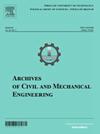Influences of temperature on carbon fiber bundles during the tensile process and associated piezoresistive model
Abstract
Carbon fiber bundles have been widely utilized in structural health monitoring due to their remarkable piezoresistive effect. However, the influence of temperature on their electrical and mechanical properties remains poorly understood. To address this knowledge gap, tensile tests were conducted on carbon fiber bundles at temperatures ranging from − 20 to 180 °C, and the change in contact resistance with temperature was investigated. The results indicate that the resistance change rate of the carbon fiber bundle is negatively correlated with temperature. A high degree of linearity and consistency was observed between the resistance change rate and the temperature of the carbon fiber bundle during multiple heating and cooling cycles. Within the temperature range of – 20 to 180 °C, the influence of temperature on the mechanical properties of the carbon fiber bundle is negligible. Temperature primarily affects the initial resistance and sensitivity coefficient of the carbon fiber bundle. Based on the test results, the traditional piezoresistive effect model of the carbon fiber bundle was modified to accurately predict the resistance and load changes of the carbon fiber bundle under strain at different temperatures. This study significantly improves the accuracy and universality of the piezoresistive effect model for carbon fiber bundles and provides a theoretical basis for structural health detection under varying temperature conditions.

 求助内容:
求助内容: 应助结果提醒方式:
应助结果提醒方式:


